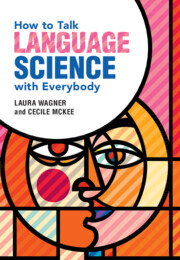Book contents
- How to Talk Language Science with Everybody
- How to Talk Language Science with Everybody
- Copyright page
- Contents
- Figures
- Preface
- Acknowledgments
- 1 Why Bother?
- 2 You Can Be the Expert
- 3 Cooperative Conversations
- 4 Conversational Goals
- 5 Know Your Audience
- 6 Creating Relevance by Generating Interest
- 7 Creating Relevance by Making Connections
- 8 Quality and Credibility
- 9 Quality vs Quantity
- 10 Learn to Listen
- 11 Information Structure
- 12 The Curse of Knowledge
- 13 Start with Examples
- 14 What’s New?
- 15 From Given to New
- 16 The Three-Legged Stool Approach
- 17 Working with a Range of Different Audiences
- 18 Where Can I Go?
- 19 Being a Good Partner
- 20 Finale
- Appendix Teaching with This Book
- References
- Index
8 - Quality and Credibility
Published online by Cambridge University Press: 17 May 2023
- How to Talk Language Science with Everybody
- How to Talk Language Science with Everybody
- Copyright page
- Contents
- Figures
- Preface
- Acknowledgments
- 1 Why Bother?
- 2 You Can Be the Expert
- 3 Cooperative Conversations
- 4 Conversational Goals
- 5 Know Your Audience
- 6 Creating Relevance by Generating Interest
- 7 Creating Relevance by Making Connections
- 8 Quality and Credibility
- 9 Quality vs Quantity
- 10 Learn to Listen
- 11 Information Structure
- 12 The Curse of Knowledge
- 13 Start with Examples
- 14 What’s New?
- 15 From Given to New
- 16 The Three-Legged Stool Approach
- 17 Working with a Range of Different Audiences
- 18 Where Can I Go?
- 19 Being a Good Partner
- 20 Finale
- Appendix Teaching with This Book
- References
- Index
Summary
Chapter 8 opens by asking readers to reflect on the attributes of someone who they find trustworthy and believable. It then describes three attributes that Aristotle described for credible people: practical intelligence, virtuous character, and goodwill. Modern research on people’s perceptions of scientific sources finds similar attributes: expertise, integrity, and benevolence. The chapter reviews ways that science communicators can show these attributes. For example, we need to understand the phenomenon we’re sharing; we need to be honest, which can include saying "I don’t know" when applicable; and we need to be respectful. Being clear is a sign of respect for our conversational partners, as is sincere listening. This chapter returns to a comparison of the deficit model and funds of knowledge approaches before discussing ways to handle opinions that contradict the scientific consensus or that are in some way offensive. The Worked Example concerns stereotypes. This chapter’s Closing Worksheet asks readers to identify three things about their demonstrations that they are confident about and three things that they do not know related to their demonstrations.
Keywords
- Type
- Chapter
- Information
- How to Talk Language Science with Everybody , pp. 91 - 100Publisher: Cambridge University PressPrint publication year: 2023



